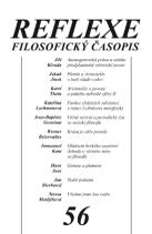How to Think Subjects without Making them into Mere Objects. A Disputation with Ladislav Hejdánek
Ladislav Hejdánek’s twelve theses provide here an introduction to a discussion about his philosophy of „non-objectiveness“, i.e., a philosophy that strives to think subjects without making them into mere objects. Such a philosophy takes its point of departure in viewing a subject (i.e., any „natural unit“) as an event which is only in part a „being“ in the traditional sense and more importantly „no-more-a-being“, as well as „not-yet-a-being“. Consequently, reality is not mere actuality; rather, it stretches into the past and future of each subject. The subject has its inner, „non-objective“ side, and thus it ought not to be reduced into a mere „object“. The relation of the subject’s interior and its exterior is not to be understood as a spatial one, for above all it is temporal. Through active subjects, the future becomes an actuality and then passes into the past. In order to inquire into the way in which reality is not an „object“ we need a new type of thought, one that has not yet been developed: a „non-objective“ thought.
In the following discussion, consisting of seven contributions, some papers react immediately to the theses of L. Hejdánek: thus P. Kouba, Non-objectiveness in reality: a pure future, or a living present?, and L. Karfíková, Interior and time. Some are devoted to other aspects of Hejdánek’s philosophy as it has been elaborated in his earlier publications and lectures: thus J. Kranát, Reality, and F. Karfík, What is reflection according to L. Hejdánek. Hejdánek’s position is assessed critically by J. Čapek, Event and non-objectiveness (a criticism of Hejdánek’s concept of event from a phenomenological point of view), and V. Nìmec, The problem of non-objectiveness in thought (a criticism of Hejdánek’s call to abandon the whole tradition of European philosophy). We include also the paper by J. Payne (not presented during the disputation) which focuses on the continuity of Hejdánek’s thought with that of some of his predecessors and on his understanding of truth as non-objectiveness par excellence.
Backlinks: Reflexe 28
